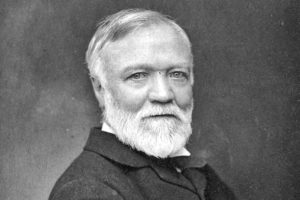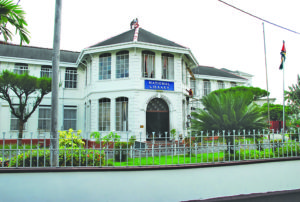By Petamber Persaud
Whenever we think about the history of the National Library of Guyana, the name Andrew Carnegie looms large in those considerations and reminiscences. But his is not the only name of substance, nor is his most fundamental gift of establishing the library the only noteworthy contribution carrying the library into its 108th anniversary in September 2017. However, his was the most significant contribution to the library.

The National Library has grown in stature since the early years of 20th century, overcoming many challenges, even the death knell of books sounded over a generation ago, which was indirectly a death knell of libraries. But there will always be books, in whatever form, and there will always be libraries, in whatever form.
I’m not using the phrase “in whatever form” with reference to books and libraries lightly. And there is an important reason for this: the maker(s) of the library’s mission statement was/were cognizant of change when making reference to ‘information in printed and other formats’. The full mission statement spells out the role of the National Library, thus: “To satisfy both nationally and internationally, the informational and recreational needs of the library’s users through the collection, organisation, dissemination and preservation of information in printed and other formats”.
It is written that ‘the only thing that is constant is change’, and the National Library has never shied away from change. When the library opened its doors to the public in September 1909, it was a closed access system in place meaning that the user’s selected material was guarded handed to him/her. Also at the beginning, the name of the institution was the Carnegie Free Library. There were several name changes: it was named the Georgetown Public Free Library, then the Public Free Library, and now the National Library.

A major change occurred in 1940 when the library became an open access system wherein the user was free to go to the shelves and choose reading material. This resulted in increased usage of the institution. Another major change occurred a decade later resulting in the expansion of library services directly to other parts of the country.
According to two former librarians, Gwyneth George and Gillian Thompson, writing “A Historical Perspective of the National Library of Guyana”, stated: “The third significant development occurred in 1950. Public Free Library Ordinance (No.13 of 1950) was passed by the Legislature. The title read ‘An Ordinance to amend the Georgetown Public Free library Ordinance in order to provide for the establishment of branch public libraries and other public library services at any place within the colony’.”
Today, the National Library, which is referred to as Central Library, has five branches: Corriverton, New Amsterdam, Ruimveldt, Linden, and Bagotville. The library also boasts of a bookmobile service, over 30 centres and numerous ‘Deposit Collections’ in communities too small for the establishment of a centre, all “in service to the community” – as its motto reads.
Today, the National Library continues its mandate to empower the community as it strives to improve the literacy and numeracy level in this information age.
All of this would not have been possible without the initial contribution of Andrew Carnegie, philanthropist and visionary. The National Library of Guyana was established in 1909 with funding provided by Andrew Carnegie, who in the 1880s set up a fund for the establishment of libraries all over the world. This library was among five libraries in the West Indies that was founded by Carnegie. It is recorded that he was responsible for the establishment of some 2,500 libraries.
Apart from having money, Carnegie had a vision for society through the services of libraries. A few of his quotations will attest this:
A library outranks any other one thing a community can do to benefit its people. It is a never failing spring in the desert.
I choose free libraries as the best agencies for improving the masses of the people, because they give nothing for nothing. They only help those who help themselves.
There is not such a cradle of democracy upon the earth as the Free Public Library, this republic of letters, where neither rank, office, nor wealth receives the slightest consideration.hank you Andrew Carnegie and happy 108th anniversary National Library!
Responses to this author telephone (592) 226-0065 or email: oraltradition2002@yahoo.com



